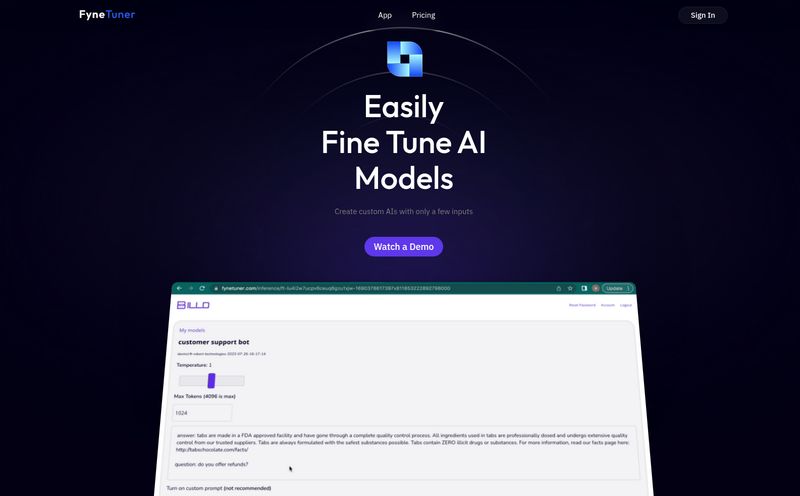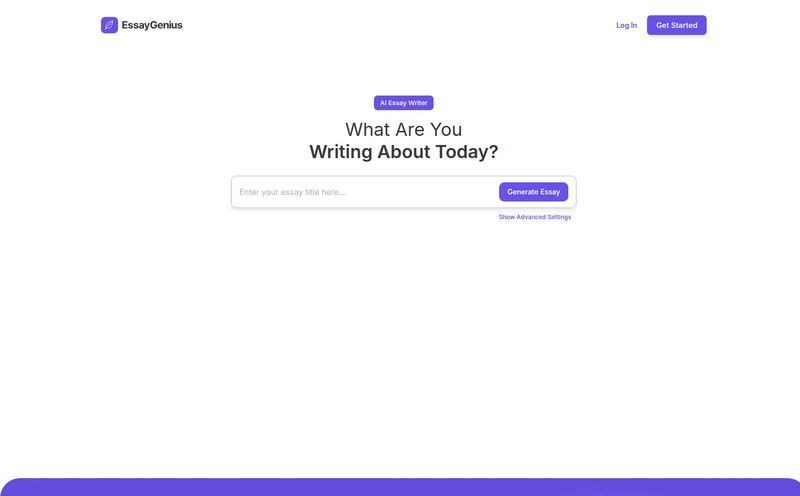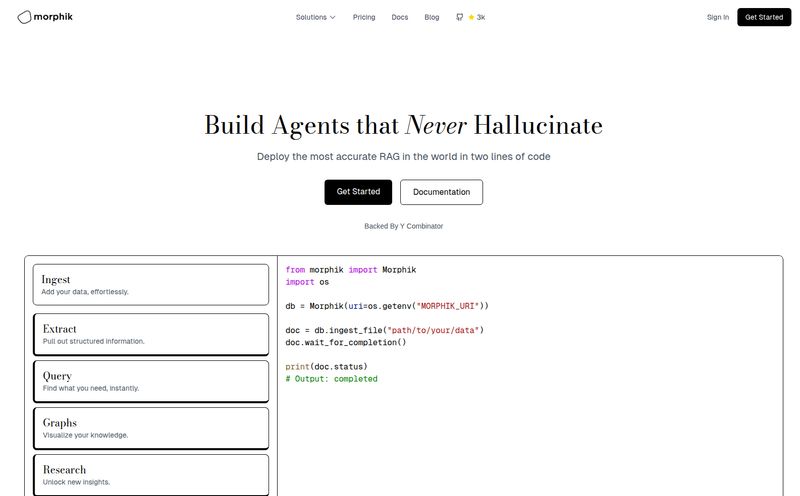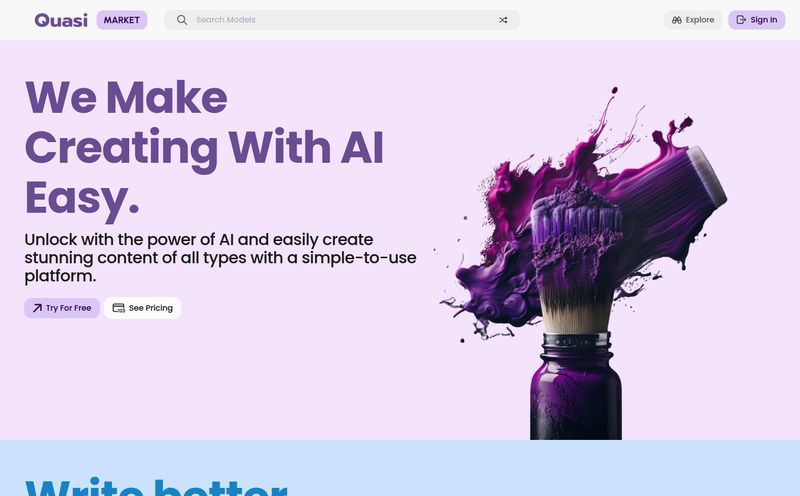There’s a universal truth in the software world, a dark secret we all share but rarely speak aloud: writing documentation is the absolute worst. It’s the digital equivalent of eating your vegetables. You know it’s good for you, you know it’ll pay off later, but in the moment? You’d rather do literally anything else. I’ve been there. You’ve been there. We’ve all stared at a beautiful, complex piece of code and thought, “I’ll document this later.”
And “later” never comes. The result is a wasteland of outdated Confluence pages, cryptic README files, and legacy codebases that are basically archaeological dig sites. When a key developer leaves, they take all that institutional knowledge with them. It’s a huge, expensive problem.
So when I heard the promise of a tool like DocGen—summarized by the almost-too-good-to-be-true tagline, “Documentation that writes itself”—my inner skeptic and my hopeful optimist got into a fistfight. Could an AI really tackle the one task that developers universally despise? I had to find out.
What Exactly is DocGen? (And Why Should I Care?)
At its heart, DocGen is an AI-powered documentation generator. But that’s a bit of a dry description. Think of it more like a brilliant, multilingual programmer who can instantly read any codebase—no matter how old or tangled—and then explain it to you in plain English. It connects to your repositories, runs its AI analysis engine over the code, and spits out comprehensive documentation.
This isn’t just about pulling function names and parameters. It’s designed to solve the real, gritty problems we face every day:
- That terrifying legacy project no one has touched in five years.
- The wildly inconsistent formatting between one dev’s comments and another’s.
- The constant, nagging fear that your documentation is hopelessly out of sync with your actual code.
DocGen steps in and says, “Don’t worry, I got this.” It’s a bold claim, but one that could genuinely change how teams operate.
My First Impressions: A Look at the Core Features
After playing around with it, a few things really stood out. This isn't just another Javadoc-style scraper. The approach feels more holistic.
It's Not Just About Comments, It's About Understanding
One of the coolest things is the architecture overview visualization. This is huge. Instead of just getting a list of functions, DocGen can generate a visual map of how different parts of your system connect and interact. For anyone who’s ever had to onboard onto a complex microservices architecture, you know this is worth its weight in gold. It’s like being handed a GPS for a city you’ve only seen on a postcard. It turns the abstract into something tangible.
Speaking My Language (And Yours, and Theirs)
The platform boasts support for any programming language. While I’m sure there are some esoteric exceptions, its ability to handle everything from Python and JavaScript to Go and Rust is a major selling point. In today’s polyglot development environments, you need a tool that doesn’t flinch when it sees three different languages in one project. It breaks down those language barriers, ensuring the documentation has a single, consistent voice and style, regardless of the underlying code's language.
The End of “Outdated Doc” Syndrome
And this, my friends, is the holy grail. The feature that made me sit up and pay attention. Code-doc synchronization. DocGen keeps your documentation in sync with your code changes. Let that sink in. When a developer pushes a change to a function, the documentation can be updated automatically. This feature alone targets the single biggest point of failure in manual documentation. No more stale wikis. No more guessing if the docs you’re reading are from last week or last year. Its a legitimate game-changer.
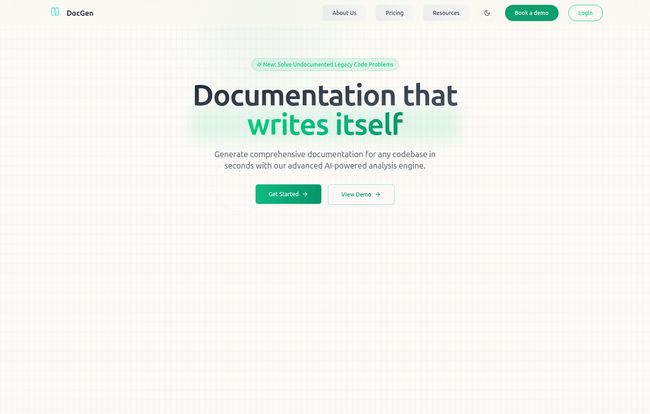
Visit DocGen
The Million-Dollar Question: How Much Does DocGen Cost?
Alright, so it sounds great, but what's the damage to the wallet? The pricing page is pretty straightforward, which I appreciate. They’ve broken it down into three main tiers that make a lot of sense for different types of users.
| Plan | Price | Best For | Key Features |
|---|---|---|---|
| Free | $0 | Solo creators & hobbyists | 1 user, 1 project, 3 repos, basic documentation |
| Pro | $69/month | Growing teams | Unlimited projects, advanced templates, API references, priority support |
| Enterprise | Custom | Large organizations | Unlimited everything, SSO, private hosting, dedicated support |
The Free tier is actually pretty generous for a solo dev or for just trying things out. The Pro plan at $69/month (for the first user, then $25 for each additional one) feels like the sweet spot for most startups and mid-sized teams. When you calculate the cost of developer hours spent writing—or worse, deciphering—documentation, that price starts to look very, very reasonable. The Enterprise plan is the classic “if you have to ask, you can afford it” tier, with all the security and support big companies need.
Where DocGen Shines (and Where it Stumbles a Bit)
No tool is perfect, right? After the initial excitement, you have to do a reality check. DocGen is incredibly powerful, but it’s an assistant, not a magician.
The biggest pro is obvious: it reclaims an obscene amount of developer time and sanity. It tackles the grunt work, freeing up your most expensive resources to focus on what they do best: solving complex problems. It also secures knowledge. The “bus factor”—the risk of a project derailing because a key person gets hit by a bus (or just wins the lottery)—is real. DocGen acts as a knowledge repository, ensuring that understanding of the code doesn't just live inside someone's head.
On the flip side, the reliance on AI means you still need a human in the loop. The generated documentation is a fantastic, high-quality first draft, but it might miss the why behind a particularly weird business rule or a quirky implementation choice. I’d always recommend a quick human review to add that final layer of context. Some might argue that code should just be self-documenting, and while I agree in principle, that philosophy breaks down fast in large, complex systems. DocGen doesn't replace clean code; it complements it.
Who is This Tool Actually For?
I can see a few groups getting massive value from this.
- Startups and Scale-ups: You’re moving fast, and documentation is the first thing to get dropped. DocGen can build that good habit for you, ensuring you don't build up a mountain of technical debt.
- Consultancies and Agencies: Jumping between projects is your bread and butter. Being able to quickly generate docs for a new client's codebase or provide excellent documentation as a deliverable is a huge competitive advantage.
- Large Enterprises with Legacy Systems: If you've just inherited a 15-year-old COBOL system with zero comments, this tool might be your new best friend. It’s a powerful weapon for modernization projects.
If you're a solo developer on a small, clean project, the free tier is perfect. But if you’re part of a team where knowledge sharing and time are critical, the Pro plan is a no-brainer.
Frequently Asked Questions About DocGen
- How accurate is the AI documentation?
- It's impressively accurate at describing the what and the how of the code. It accurately details functions, classes, and dependencies. Where it needs a human touch is in explaining the why—the business context that led to a specific decision.
- Does DocGen support my favorite obscure programming language?
- It claims to support any language. For mainstream languages like Python, Java, C#, and TypeScript, it works flawlessly. For more niche languages, it’s best to test it with the free plan, but the underlying analysis engine is designed to be language-agnostic.
- Is my code secure when using DocGen?
- This is a critical question. DocGen, like most modern dev tools, takes security seriously. For teams with strict compliance needs, the Enterprise plan offers private hosting options, ensuring your code never leaves your own infrastructure.
- Can I customize the output and templates?
- Yes. The Pro and Enterprise plans offer advanced documentation templates and custom branding options. This allows you to generate docs that fit perfectly with your existing company style guides and wikis.
- Is the free plan actually useful or just a teaser?
- In my opinion, its genuinely useful for its target audience: solo creators and small projects. The limits are reasonable for getting a feel for the tool or for maintaining a personal project. It’s more than just a crippled demo.
So, is it Time to Automate Your Docs?
Look, is DocGen a silver bullet that will solve all your problems and bring about world peace? Probably not. But is it a massive leap forward in tackling one of the most tedious and costly aspects of software development? Absolutely.
For years, we’ve just accepted that documentation has to be a manual, painful process. We’ve accepted that knowledge will be lost and that onboarding will be slow. Tools like DocGen challenge that assumption. They use AI not as a gimmick, but as a practical solution to a real-world problem. By automating the grunt work, it gives us back our most valuable asset: time. Time to build, time to create, and time to solve the next big problem, instead of explaining the last one.
